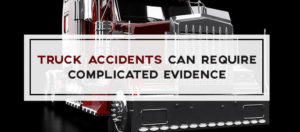 If you are injured in a truck accident, it is not enough to simply claim the truck driver or trucking company was at fault. Instead, you must present enough evidence to sufficiently prove that one of these parties acted in a negligent manner. Evidence in truck accident cases can be more complicated than in a regular car accident case, and the following are some of many types of evidence that may help in your case.
If you are injured in a truck accident, it is not enough to simply claim the truck driver or trucking company was at fault. Instead, you must present enough evidence to sufficiently prove that one of these parties acted in a negligent manner. Evidence in truck accident cases can be more complicated than in a regular car accident case, and the following are some of many types of evidence that may help in your case.
The “Black Box”
After a plane crash, authorities are often focused on recovering the “black box” to help determine the cause of the accident. Commercial trucks also have black boxes and these can be very helpful following a truck accident. “Black box” refers to the event data recorder, which records data regarding speed, braking, and other operational functions of the truck. The black box can show whether a truck driver failed to brake or was speeding just before the collision. These can all be signs that the driver was acting in a careless or negligent manner that led to the crash.
Dashboard Cameras
Many–but not all–trucking companies have begun installing dashboard cameras in the trucks in their fleet. Some of these cameras face out toward the road in front of the truck and the footage can show whether a driver was tailgating, making unsafe lane changes, swerving, or slammed on the brakes, which can indicate distracted driving. Some trucks also have cameras that record the actions of the driver and, after a crash, the footage will reveal whether the driver was engaging in distracted driving, falling asleep, or even drinking alcohol behind the wheel. For these reasons, camera footage can be very useful to prove negligence on the part of the truck driver.
Citations
Truck drivers are expected to follow all traffic laws as well as numerous additional rules and regulations enacted and enforced by the Federal Motor Carrier Safety Administration (FMCSA).1 Some of these regulations involve:
- Driving under the influence — Commercial drivers have a lower legal limit of 0.04% blood alcohol content (BAC).
- Handheld device ban — Regulations prohibit commercial drivers from using a handheld device2 to text, talk, or for any other purpose. There are also limits on hands-free cell phone use.
- Inspections — Drivers are required to perform thorough safety inspections of the rig before every driving shift.
- Hours of service 3 — These regulations require drivers to take rest breaks after a certain number of hours or days on the road to prevent fatigued driving.
If a driver is cited by local law enforcement or by the FMCSA for violating a law, that citation can be used as evidence of negligence in your legal claim.
Alcohol and Drug Testing
According to the FMCSA, truck drivers must be tested for alcohol and/or drugs following certain accidents. For example, if a crash resulted in a fatality, the driver must always be tested. Testing must also occur if the driver was cited for a moving violation and the crash caused injury or serious damage. Some companies have policies to test drivers after every accident. If the results of post-accident testing indicate the driver was over the legal limit or had illegal drugs in their system, you can use this important evidence to hold the driver liable.
Accidents Investigations
After serious truck accidents, the federal National Transportation Safety Board (NTSB) may send investigators to determine the cause of the accident. Even if the NTSB does not involve itself in the crash, private accident reconstruction specialists can evaluate the circumstances of the accident and provide expert analysis and conclusions about what caused the accident. Finding of either the NTSB or private experts can be helpful evidence in your case.
Logbooks and Records
Both FMCSA regulations and trucking company policies require that drivers and other company employees keep careful records regarding a variety of issues. Some records that may be helpful in your truck accident case can include:
- Logbooks showing hours and days a driver worked;
- Delivery schedules;
- Records from dispatchers;
- Driving records and accident history of truck drivers;
- Maintenance and inspection records.
Call a Philadelphia Truck Accident Attorney for a Free Consultation
You may not know where to begin in gathering the types of evidence you need to prove negligence in your truck accident case. At The Levin Firm Personal Injury Lawyers, we have the resources to obtain and present complex evidence in your case so that you can recover for your losses. Please call a Philadelphia truck accident lawyer today at 215-825-5183 for help.